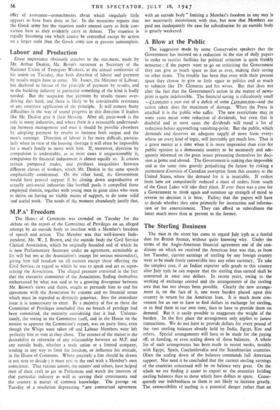M.P.s' Freedom
The Hous! of Commons was crowded on Tuesday for the debate on the report of the Committee of Privileges on an alleged attempt by an outside body to interfere with a Member's freedom of speech and action. The Member was that well-known Inde- pendent, Mr. W. J. Brown, and the outside body the Civil Service Clerical Association, which he originally founded and of which he is now Parliamentary Secretary under an agreement, terminable at his will but not at the Association's (except for serious misconduct), giving him full freedom on all matters except those affecting the Civil Service, in regard to which he was to speak and act as repre- senting the Association. The alleged pressure consisted in the fact that the executive committee of the Association, finding themselves embarrassed by what was said to be a growing divergence between Mr. Brown's views and theirs, sought to persuade him to end his agreement with the Association by consent and on financial terms which must be regarded as distinctly generous. Into the immediate issue it is unnecessary to enter. By a majority of five to three the Committee of Privileges concluded that no breach of privilege had been committed, the minority considering that it had. Unfortu- nately, the voting in the Committee itself, and in the House on the motion to approve the Committee's report, was on party lines, even though the Whips were taken off and Labour Members were left perfectly free to vote as they chose. The essence of the matter is the desirability or otherwise of any relationship between an M.P. and any outside body, whether a trade union or a limited company, tending in any way to limit his freedom, or influence his attitude, in the House of Commons. Where precisely a line should be drawn is not easy to decide ; it must rest in the end with a Member's own conscience. That various unions, the miners' and others, have helped men of their craft to get to Parliament and watch the interests of that particular industry as well as serving their constituents and the country is matter of common knowledge. The paisage on Tuesday of a resolution deprecating " any contractual agreement
with an outside body ", limiting a Member's freedom in any way is not necessarily inconsistent with that, but now that Members are paid not inadequately the case for subsidisation by an outside body is greatly weakened.


































 Previous page
Previous page